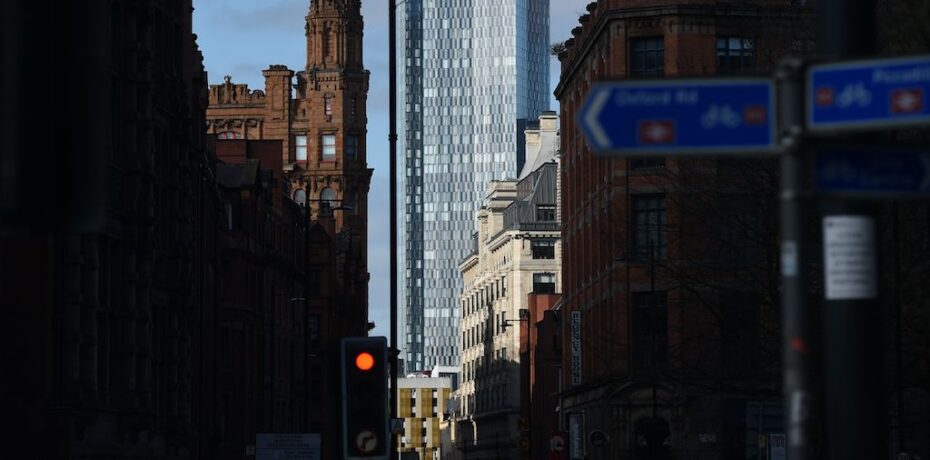The Subplot
The Subplot | Manchester reaches the tipping point
Welcome to The Subplot, your regular slice of commentary on the North West business and property market from Place North West.
THIS WEEK
- EXCLUSIVE: Landsec boss Mark Allan shares his plans after the developer’s dramatic Manchester debut
- Better than Rome: Manchester’s property market seen from Europe

THREE DAYS THAT CHANGED EVERYTHING
 Landsec buys very big and plans to build fast
Landsec buys very big and plans to build fast
In the space of just three days London-based property giant Land Securities acquired a 2.5m sq ft office and 3,300-unit residential development portfolio in two of the primest of prime Greater Manchester sites. As the dust settles chief executive Mark Allan (left) talks to Subplot about what comes next.
On Monday last week Landsec’s vehicle LS Developments splashed into Greater Manchester with a £190m offer for U+I, the jewel in whose crown is the 24-acre Mayfield office and residential development next to Piccadilly station. Barely 48 hours later, Landsec paid £425.6m for a 75% stake in Media City Salford, buying out Legal & General’s 50% and half of the Peel L&P holding. LandSec obviously means business. The £12bn firm is in the midst of a mighty reshaping in which a wider spread (regions, offices, BTR) all play a part. Manchester is Landsec boss Mark Allan’s biggest test and the firm’s big hope.
They mean you
And it really is just Greater Manchester. Chief executive Mark Allan says that, for now, they do not have plans to buy anywhere else. “It happened that the two most deliverable sites we looked at were in Manchester,” says Allan. “But Manchester is also the largest economy, and office market, and BTR market outside London. It is growing faster than anywhere else and has been for the last five years. It is coming out of the pandemic fast, and it’s got a real identity. So had there been other deliverable sites elsewhere in the regions, they wouldn’t necessarily be the ones to take. New projects have to be deliverable in a city with prospects.”
In a nutshell
“We’ve still got a shopping list – there are a number of other options – but these two were the most attractive because they have planning consent and, at Media City, an existing revenue-generating business. They were immediately progressable and we could see opportunities to work with great local partners in Peel and U+I.”
The old trap
The partners matter. Allan says he is “1000% conscious” of the long history of arrivals from London failing to transplant successfully to Manchester. He does not want to fall into that deadly trap. “It is why we wanted partners at both sites, who understand what works and what doesn’t. We want access to the lessons learned. Personally, I don’t consider myself a London person – in previous jobs at St Modwen and Unite I’ve developed in Birmingham, Liverpool, Glasgow – but I am very conscious that Landsec coming in and saying we know best would end very badly.”
A choice of one
Long story short: Allan can only really achieve what he wants to in Manchester. Like all the big names, Landsec feels the need to spread its bets (geographically and by sector), but to do so in a risk-minimising way. If you’re a big UK name with a heavy London and South East bias, you can only really do this by coming to Greater Manchester, because it is new (to them) but also solid (it’s not new to anyone else). Both Greater Manchester sites offer scope to expand into build-to-rent, to hedge on regional offices with a healthy diverse mix of occupiers. They get scale, quickish results and, at MediaCity, they also get a powerful existing rental income to keep the shareholders happy. MediaCity’s rent roll is £31.1m, reflecting a net initial yield of 5.8%, the kind of generous number now long out of reach in the capital. “Attractively priced,” says Allan.
More offices soon
So what happens at each site? MediaCity will probably see the biggest shake-up, and it will come fast. A 200,000-300,000 sq ft office scheme looks imminent, followed by a re-think of the second phase to tip the balance back towards the office sector (and a little away from residential). The existing second phase consent includes 540,000 sq ft of offices and 1,800 apartments. Expect that to change.
Rethink in Salford
“We’ll work with Peel, who remain development managers, to see how we can bring forward more commercial floorspace because MediaCity is effectively full and there’s still more demand, so top priority will be to get more office space,” says Allan. “By early 2023 there could be an opportunity progress with the next phase of office development, then we can think long-term about the balance of office and residential at MediaCity, and what we develop when.”
Capacity issues
Over at Mayfield, things got stuck not because it’s a bad idea, but because U+I had reached capacity constraints, the most conspicuous of which was money (its own and potential investors). Landsec liked the idea of acquiring a local partner and an oven-ready scheme, and it brings the capacity U+I lacked on its own. “We have a £12bn portfolio, and we want to sell about £4bn to reinvest in growth, and Mayfield will be one of them, though we have funding capacity on our balance sheet to deploy today,” says Allan.
We need to talk
The hiccup at Mayfield could be about restructuring the deal with the three existing public sector partners: LCR, Manchester City Council, Transport for Greater Manchester. Landsec will inevitably want to be assured that if it coughs up more, it gets more out. “It’s a partnership. We have a shared vision, but we’re not yet inside so we don’t yet know how it is approached. It’s impressive that the scheme is already on site, so it got a lot further than some other public-private sector partnerships,” says Allan, rolling the pitch.
In, out, shake it all about
Landsec has been here before, literally. It owned the Printworks leisure complex in Manchester between 2012 and 2017, generating a decent income and uplift in capital value (£98m buy, £108m sale). That adventure followed the 2011 strategic turn towards London. Back then the firm owned the Liverpool St John’s Shopping Centre and Chester’s Greyhound Retail Park. Both have since gone, though Landsec probably wishes it held onto the Chester scheme. There will be no similar regrets about the 540,000 sq ft St John’s, which was offloaded for £76.5m in 2012 (and which changed hands again last month). Today’s local portfolio includes two retail parks in Workington, the Parswood leisure strip in South Manchester, and a city centre Novotel.
The real deal
Assuming Landsec doesn’t flip its new trophies, two substantial sites are suddenly in play in a way that, seven days ago, they weren’t. But step back a little further and the big picture is so much easier to see. 1-3 November 2021 will be remembered as the moment when the region’s property market grew up.
Big picture
Why? Because after a decade of increasing interest from international investors, the region has finally cracked the toughest nut of all: the London-focused giants like Landsec who have, until now, kept clear. If Landsec is followed by Hammerson, Derwent and the other reluctant REITS, and if the major non-REIT names like Lend Lease join the party – and all those folk surely must now feel a bit behind the curve – their combined money and energy will kick the market up into another tier entirely. From now on the sky is the limit.
DRIVING THE WEEK
 When in Rome
When in Rome
Research by the Urban Land Institute and PwC points to a post-pandemic leap in Euro property confidence, particularly in Manchester, Europe’s seventh most active property market, ahead of capitals like Rome.
It is easy to get desensitised to things you see every day. What ought to be remarkable gets bundled up with the mundane. Rain is wet, dogs bark, Manchester has new skyscrapers – they’re all just one of those things. The latest deep data-trawl by the respected Urban Land Institute and its pals at PwC provides a useful corrective. It is a reminder that Greater Manchester’s economy (and because of that, its property market) is a star performer. But it is also a reminder of how much further it has to go.
Numbers game
First, the facts. Here Manchester does fairly well. Using numbers from Real Capital Analytics, the report shows that the city’s property market is the eighth busiest in Europe, judged by the value of transactions. This doesn’t sound hot until you realise that space in the list has (inevitably) to be found for two global megacities (London in first place, Paris in sixth), three mega business hubs (Milan, Frankfurt, Munich) and some powerful capitals, like Berlin. Simply to get in the top ten is an achievement.
Real rivals
Dublin and Hamburg – the real rivals and also in the top ten – make the best comparators, Dublin is one rung above Manchester, and Hamburg shares Manchester’s seventh spot. Manchester is calculated as scoring €2bn worth from Q4 2020 to Q3 2021, Paris was €3bn. Also rans were Milan and Olso.
And yet
The same list shows how far Manchester has to go. Berlin comes out with transaction values 150% higher. London is 800% higher, which perhaps explains the problem in appreciating Manchester’s real economic strength. In other words, it’s big by European standards but small by London standards which means London tends to think it’s small. This is an error.
Keep your eye on Oslo
On much wider measurers – rents, capital values and a basket of numbers that contribute to overall prospects – Manchester is 20th out of 31 serious European cities. Bottom half, but not bad, and appreciably better than capitals like Rome, Prague, Moscow, and Oslo – particularly Oslo, as you will soon see.
Now the bad news
Having done facts, let’s turn to opinion, which is where this report is most revealing. The authors compared the actual facts to what 800+ big-time fund managers and investors thought was the case. What you learn here is that some people are powerfully deluded. For instance, Athens tops the “good opinion” list but is a bottom third of the table judged by objective measures. More on this in a moment.
Public image
This part of the analysis reveals Manchester’s weakness and it may surprise many in the North West. Birmingham, which is behind on the facts, comes out ahead on the perceptions table. Oslo, also behind, is ahead on perception, and Copenhagen – more or less on a level with Manchester on the factual analysis – claims second place, where Manchester languishes at number 23. This feels odd because surely one thing Manchester has got supremely right is its marketing? So Subplot asked Urban Land Institute chief executive Lisette van Doorn what’s going on.
Lots of love
“Athens is the best example,” she says. “Athens was only scored by investors in Greece, but those investors were very positive so gave it a high score. Which is why it is at the top.” Van Doorn is suggesting Manchester gets the opposite reaction – lots of European approval and recognition, but a bit more tepid, despite the fact that it is objectively one of the busiest property markets around. “Manchester’s lower perception score suggests Brexit and Covid have had an impact, that investors have a view of the UK and that it taking time for the UK to come through,” she says. “The conclusion you could draw is that some places are not seen, yet, as a solid part of a pan-European portfolio. These are markets still dominated by relatively local players,” van Doorn says.
Work to do
The general feeling in the city-region is that Manchester sorted the marketing/brand issue long ago. This data suggests that view is a shade complacent. The city’s plucky outsider schtick needs thinking. Greater Manchester is no longer a left-field choice, a gamble, or an outside bet. It is mainstream and safe. Relatedly, the analysis also suggests that the city-region needs to strengthen the perception that it is a core part of the European market, on a level with the cities it genuinely rivals, like Dublin, Hamburg and Copenhagen (you’ll notice London isn’t relevant here). The appearance, at scale, of a more diverse cast of investors and developers will help. The city-region has already come a long way – but there is still work to be done, as the brighter of the region’s leaders know only too well.
The Subplot is brought to you in association with Cratus and Oppidan Life.






Young population, great universities with high retention, huge tech scene, large transport network, large international airport, swathes of grade A office space, 3rd most visited UK city after London & Edinburgh, 1000s of high quality jobs, international reputation, that’s before we start on culture and what Manchester has given the world. Yes Manchester has its problems which are being ironed out but its a no brainer for investment.
By Bob
The mismatch between “the facts” and the softer placings hints at something Manchester can’t fix.
By Jeff
FULLY agree with content.
Im a born and bread londoner however ive lived in manchetser/salford for the last 10 years and seen huge changes here. The skyline of manchester is changing and tonnes of regeneration works have been carried out around towns to list a few, where,i live walkden/little hulton area.
Huge amounts of new builds being built and occupied almost immediately and record speed….theres so much more i could say with actual facts.
My conclusion is that manchester is going to be the new london of the northwest……
By paul
Every one of these reports that comes out shows Manchester has moved on from simply being the Northern capital into an altogether higher league. The past 25 yrs of development have been almost unbelievable and with so much more to come I think the next 25 should prove even more compelling.
By NoRomance
What a good write-up. This highlights the vision l have had for many years.
By Philip Sharp
Cannot wait for the Clean Air Zone to kill off businesses once and for all. Inaccessible public transport and infrastructure for manual wheelchair users. Cannot use mobility scooters on the trams either.
Skirt the ring road and avoid every business therein.
By Andy Grey Rider
Great write up indeed. Still much work to be done in a number of areas but Manchester really is developing into a real powerhouse despite government kidology on ‘levelling up’ . Just another slogan by professional witterers with very little substance. The north needs to go it’s own way.
By Anonymous
Andy Grey Rider – so what’s your solution? Build loads of motorways everywhere and fill the city centre with car parks? We tried that between the 1950s and 1980s – it didn’t work, it only created an ugly city centre which nobody wanted to visit. A new approach is needed which includes everyone, not just those privileged enough to own a car.
By Anonymous
I’m loving the new and improving Manchester. Hope this all keeps up and we become the next global tourist location
By Anonymous